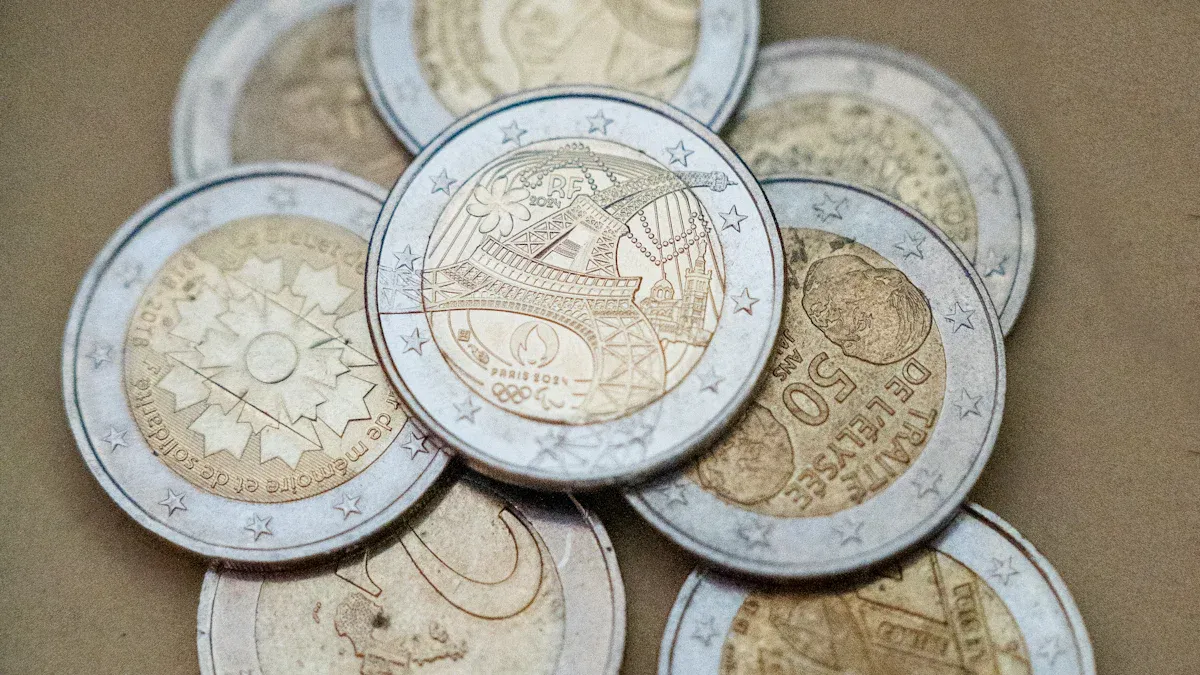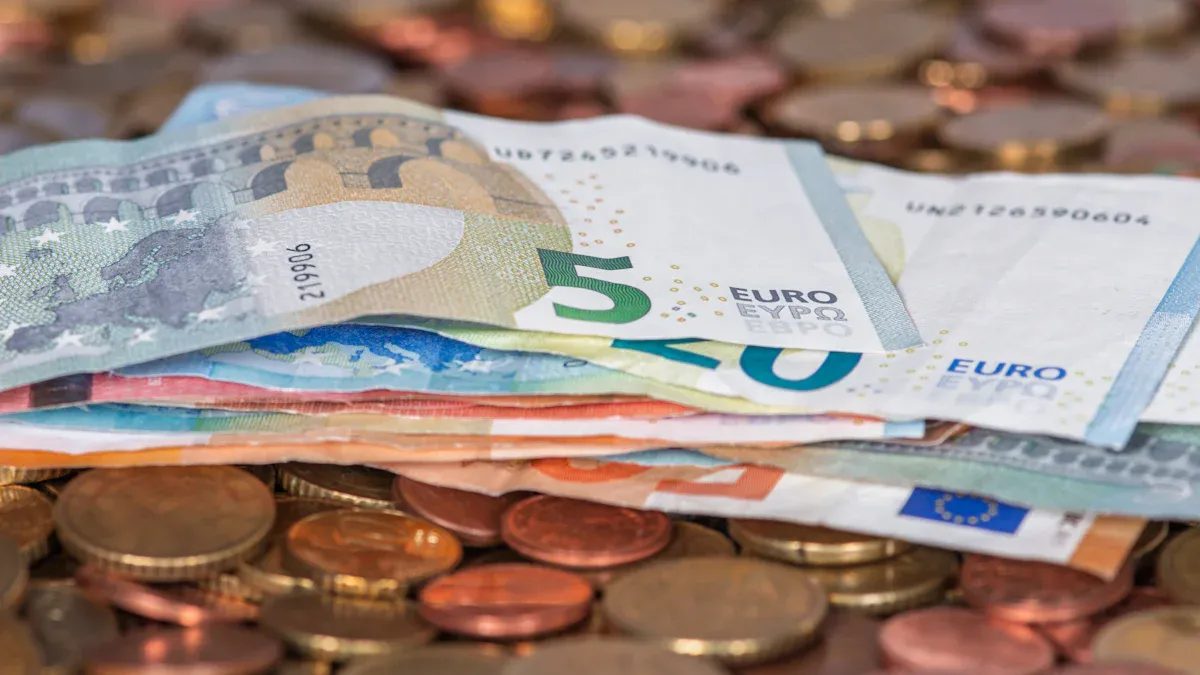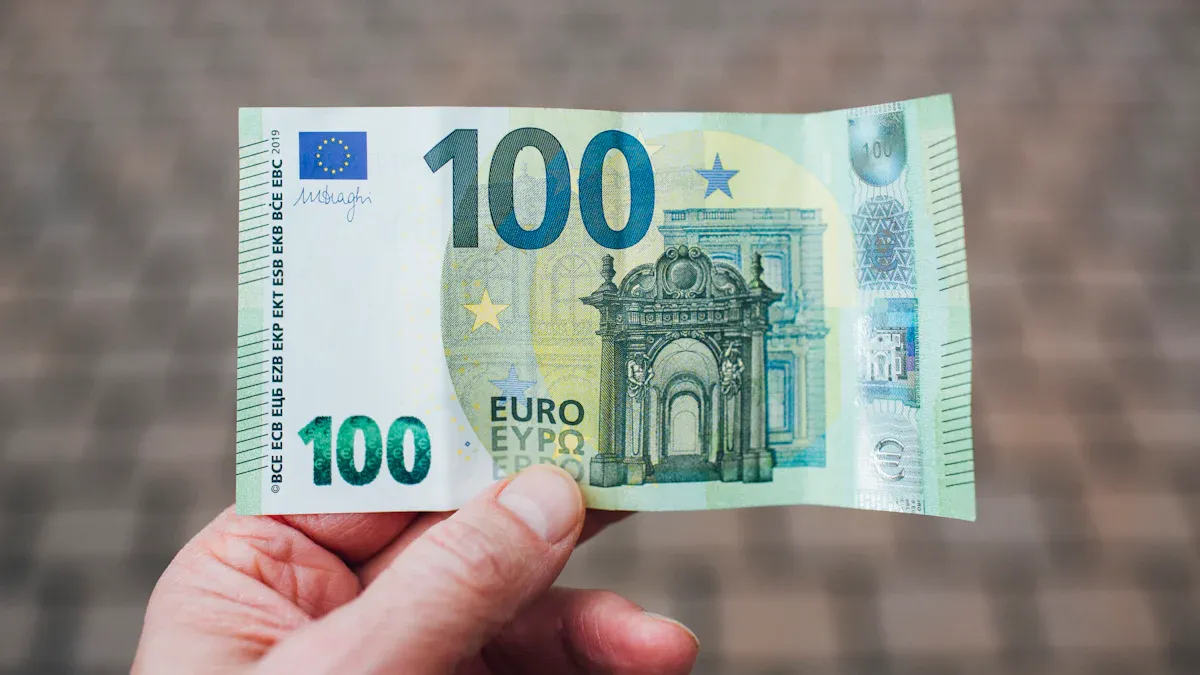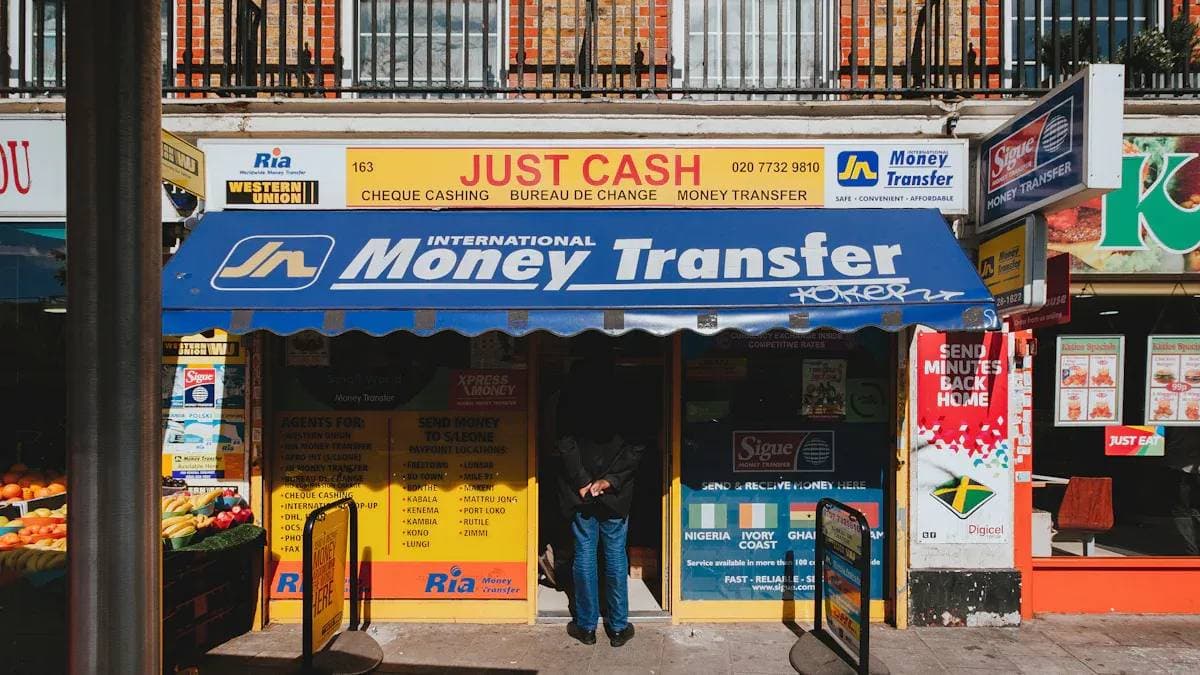- EasyCard
- Trade
- Help
- Announcement
- Academy
- SWIFT Code
- Iban Number
- Referral
- Customer Service
- Blog
- Creator
Explore the South Ireland Currency: What You Need to Know

Image Source: unsplash
You will use the euro as the official currency in South Ireland. The official currency in the Republic of Ireland is different from Northern Ireland, where you need pound sterling. When you travel to Ireland, you should know how the south Ireland currency works. Shops, restaurants, and hotels in Ireland accept the euro as the only official currency. You must pay with euro, not with U.S. dollars or any other currency in Ireland. Many travelers bring cash, but you will also see cards used often. The south Ireland currency is important for every travel plan in the Republic of Ireland. Knowing about the official currency in Ireland helps you avoid problems with payments and exchange.
Key Takeaways
- South Ireland uses the euro (€) as its official currency; Northern Ireland uses the pound sterling, so know your location before paying.
- Carry a mix of euro coins and small banknotes (€5, €10, €20, €50) for daily expenses and tips, as some places prefer smaller amounts.
- Use bank-affiliated ATMs in city centers to withdraw euros for the best exchange rates and avoid high fees at airports or hotels.
- Most shops and restaurants accept Visa and Mastercard; American Express is less common, so carry some cash for small vendors or remote areas.
- Plan your budget carefully by checking current exchange rates and expect daily costs around €67 for accommodation, €79 for food, and €25 for transport.
South Ireland Currency

Image Source: pexels
Euro Overview
You will use the euro as the official currency when you visit South Ireland. The euro has the symbol € and the code EUR. This currency is not unique to Ireland. In fact, 20 countries in the European Union use the euro as their main currency. You can see which countries use the euro in the table below:
| Number | Country |
|---|---|
| 1 | Austria |
| 2 | Belgium |
| 3 | Croatia |
| 4 | Cyprus |
| 5 | Estonia |
| 6 | Finland |
| 7 | France |
| 8 | Germany |
| 9 | Greece |
| 10 | Ireland |
| 11 | Italy |
| 12 | Latvia |
| 13 | Lithuania |
| 14 | Luxembourg |
| 15 | Malta |
| 16 | Netherlands |
| 17 | Portugal |
| 18 | Slovakia |
| 19 | Slovenia |
| 20 | Spain |
Ireland joined the eurozone in 1999. You could only use the Irish pound before that. The switch to the euro happened in 2002, when you started seeing euro coins and notes in shops and banks. The change made travel and trade easier across Europe. The euro also helped Ireland connect more with other European countries. When you use the euro in South Ireland, you use the same currency as millions of people in Europe.
Denominations
You will find both coins and banknotes when you use the euro in Ireland. The euro divides into 100 cents. You can use coins for small purchases and notes for larger amounts. Here are the denominations you will see:
- Coins: 1 cent, 2 cent, 5 cent, 10 cent, 20 cent, 50 cent, €1, and €2.
- Banknotes: €5, €10, €20, €50, €100, €200, and €500.
You will notice that most shops and ATMs in Ireland give you notes up to €100. The Central Bank of Ireland issues euro banknotes, but only prints €10 notes locally. You may see €200 and €500 notes, but these are rare in daily life. All euro banknotes look the same in every country that uses the euro. The designs show bridges and windows from European history.
Tip: When you pay for things in Ireland, you should carry a mix of coins and small notes. Many places prefer smaller denominations, especially for small purchases.
Unique Irish Coins
Irish euro coins have special features that set them apart from coins in other eurozone countries. Every Irish euro coin shows the same national design. You will see a Celtic harp on each coin. The harp is the national symbol of Ireland. The word “Éire,” which means Ireland in the Irish language, appears on every coin. Each coin also shows the year it was made. Unlike some countries that use different designs for each coin, Ireland uses the same design for all eight coins. This choice shows the pride Ireland has in its culture and history.
You will find that Irish money, especially coins, feels unique even though it works the same as euro coins from other countries. When you collect coins during your trip, you will notice the harp and the word “Éire” on every piece. This makes Irish currency easy to recognize and a special part of your travel experience.
Exchange Currency in Ireland

Image Source: pexels
Where to Exchange
You have several options when you want to exchange currency in Ireland. The most common places include banks, currency exchange outlets, and specialized bureaus in city centers. You can also find exchange services at airports and hotels, but these usually offer poor rates and higher fees. If you want the best exchange rate, you should visit a bureau in town or a bank branch.
Here is a table with some popular currency exchange locations in Dublin:
| Currency Exchange Location | Address | Opening Hours | Contact |
|---|---|---|---|
| N⁰1 Currency Exchange | 1 Westmoreland Street, Dublin 2 | Mon-Fri: 9:30 AM - 6 PM; Sat: 10 AM - 6 PM; Sun: 11:30 AM - 5 PM | Phone: +353 0818 253 411 |
| FCEI Shop 1 | 1 Lower O’Connell Street, Dublin 1 | Mon/Wed/Fri: 9 AM - 8 PM; Tue/Thu: 9 AM - 4:30 PM; Sat: 9 AM - 7 PM; Sun: 10 AM - 6 PM | Phone: +353 01-8745005; Email: info@fcei.ie |
| FCEI Shop 2 | 37 College Green, Dublin 2 | Mon-Fri: 9 AM - 5:30 PM; Sat: 9 AM - 6 PM; Sun: 10 AM - 6 PM | Phone: +353 6750 898; Email: info@fcei.ie |
You should avoid exchanging money at airports or hotels. These places often charge higher commission fees and offer less favorable rates. Exchange bureaus in city centers usually provide rates close to the mid-market rate, with a small margin of about 2-3%. Banks in Ireland also offer currency exchange, but they may charge a similar margin. You will not find true “zero commission” offers, as most fees are hidden in the rate itself.
If you plan on buying Irish currency before your trip, check the current rate online. This helps you compare offers and avoid overpaying. Always bring clean, undamaged bills if you want to exchange cash. Some banks may waive fees for account holders, so ask your bank before you travel.
ATMs and Cards
Using an ATM is one of the easiest ways to get euros in Ireland. You will find Irish bank ATMs in airports, train stations, shopping centers, and on busy streets. ATMs usually give you a fair exchange rate, often better than what you get at a currency exchange counter. You can use your debit or credit card to withdraw cash directly in euros.
Most ATMs in Ireland accept cards from major networks like Visa, Mastercard, and UnionPay. You should use bank-affiliated ATMs to avoid extra fees. Some independent ATMs may charge higher fees or offer less favorable rates. When you use an ATM, you should always choose to be charged in euros, not your home currency. This helps you avoid dynamic currency conversion, which can add extra costs.
Money and credit cards in Ireland are widely accepted. Contactless payments are very popular in shops, restaurants, and hotels. About 65% of retail transactions use contactless payments, which makes shopping fast and easy. You can use mobile wallets like Apple Pay or Google Pay for even more convenience. For purchases above $54 (about €50), you may need to use chip-and-pin. Staff in Ireland know how to handle both types of card payments.
Note: Always notify your bank before you travel. This helps prevent your card from being blocked for suspicious activity. Ask your bank about partner banks in Ireland to reduce ATM fees.
Tips to Avoid Fees
You can save money by following a few simple tips when you exchange currency in Ireland:
- Use travel cards like Wise or cards with no foreign transaction fees. These cards often give you the best exchange rate and do not add extra charges.
- Withdraw cash from bank-affiliated ATMs. Limit the number of withdrawals to reduce fixed fees.
- Always pay in euros when using your card. Reject dynamic currency conversion offers. DCC can add up to 18% to your transaction, making it much more expensive than the standard bank rate.
- Make larger purchases or fewer ATM withdrawals. This helps you avoid paying multiple fixed fees.
- Stay informed about the current euro rate. Check online before you travel or exchange money.
- Plan your money transfer needs ahead of time. Notify your bank and research if your bank has partner branches in Ireland.
- Use currency exchange outlets in city centers for better rates. Avoid exchanging large amounts at airports or hotels.
Tip: Dynamic currency conversion may seem convenient, but it almost always costs more. Always choose to pay in euros for the best value.
You can also consider setting up a foreign currency account if you travel to Ireland often. This helps you manage money transfer and avoid frequent conversions. If you need to send money to Ireland, use a reputable money transfer service for better rates and lower fees.
By following these tips, you can make the most of your euro and avoid unnecessary costs. Careful planning helps you get the best value when you exchange currency in Ireland.
Currency in Ireland: Practical Tips
Cash vs. Card
You will notice that card payments dominate in Ireland. About 60% of online transactions use credit or debit cards. Cash now accounts for only 20% of in-person purchases, which is a big drop from 38% in 2019. You can use your card almost everywhere, including shops, restaurants, and hotels. Many people prefer contactless payments for speed and safety. However, you should still carry some cash for special situations. Some small vendors, street performers, and local tours may only accept cash. Certain cards, like AMEX or Diner’s Card, are not widely accepted. You may also need cash in remote areas where ATMs are rare.
| Situation Category | Examples / Details |
|---|---|
| Tips and Optional Activities | Tips for activities and tour guides; paying for local tours and lessons |
| Small-scale Vendors | Food trucks, craft stalls, buskers |
| Card Acceptance Limitations | Some cards not accepted (AMEX, Diner’s Card, JCB, Discovery) |
| Remote Locations | Off-the-beaten-track areas with few ATMs |
Tip: U.S. dollars are not accepted as payment in Ireland. Always use the euro for purchases.
Carrying Denominations
You should carry a mix of euro coins and small banknotes for daily expenses. The most practical banknotes are €5, €10, €20, and €50. Larger notes like €100, €200, and €500 are rarely used and may not be accepted by small shops. All euro coins are useful for small purchases, tips, and public transport.
| Denomination Type | Denominations Available | Practicality for Everyday Use |
|---|---|---|
| Banknotes | €5, €10, €20, €50, €100, €200, €500 | €5, €10, €20, €50 are most practical |
| Coins | 1c, 2c, 5c, 10c, 20c, 50c, €1, €2 | All coins are practical for daily transactions |
If you plan to travel to both Ireland and Northern Ireland, you need both euros and pounds. Each region uses its own currency. Shops in Ireland will not accept pounds, and shops in Northern Ireland will not accept euros.
Exchange Rates
You should always check the current conversion rates before you travel. The euro’s exchange rate against the U.S. dollar and the British pound changes often. Over the past year, the euro has gained about 8.15% against the U.S. dollar and 3.15% against the British pound. This means your travel budget may buy more or less, depending on the rate.
| Currency Pair | Current Rate (Jul 25, 2025) | 1-Day Change | 1-Month Change | 12-Month Change |
|---|---|---|---|---|
| EUR/USD | 1.1740 | -0.12% | +0.40% | +8.15% |
| EUR/GBP | 0.8699 | -0.03% | N/A | +3.15% |
You will get better exchange rates at city center banks and ATMs than at airport counters. Airport exchange services often have poor rates and higher fees. Withdrawing euros from ATMs gives you a fair rate, but always check for extra bank fees. The actual rate depends on your card network and your bank’s policy. For the best value, use a card with no foreign transaction fees and notify your bank before you travel.
Travel money tips: Always compare currency exchange rates before your trip. Use ATMs in city centers for the best rate. Avoid exchanging large amounts of cash at airports.
Restrictions and Leftover Currency
Currency Limits
You can bring cash into or out of Ireland, but you must follow certain rules. If you carry €10,000 or more (about $11,740 USD) in cash or other currency, you must declare it to Irish Customs. This rule applies whether you travel alone or with a group. Customs will count the total amount carried by everyone in your group or family. You must declare the cash even if each person carries less than €10,000, but the total is higher.
Note: Customs officers may ask about the source of your money and your travel plans. You should keep documents that show where your currency comes from.
Declaration Rules
When you travel with large amounts of currency, you must fill out a declaration form. You can submit this form up to 72 hours before your trip. The form asks for:
- Your name and contact details
- Your travel route and dates
- The source of your currency
- The reason you carry this money
Irish Customs uses this information to prevent illegal activities. If you do not declare your cash, you may face fines or have your currency seized. Always check the latest rules before you travel.
Handling Leftover Euros
You may have leftover euro notes or coins at the end of your trip. You have many ways to use or exchange this currency:
- Spend leftover currency at the airport on snacks, toiletries, or gifts.
- Use coins for airport toilets or vending machines.
- Pay your final hotel bill or tip staff with your remaining cash.
- Donate leftover currency to charity boxes at the airport or on your flight.
- Top up a Starbucks card with euros before you leave Ireland.
- Save some currency for your next trip to Ireland or another country that uses the euro.
- Exchange leftover bills at a bank or currency exchange service. Some places offer buyback programs, but they may not accept coins.
- Sell leftover currency online through specialized services.
Tip: Do not spend all your currency too early. Keep enough for unexpected expenses, such as flight delays or extra transport costs.
A table below shows common options for leftover currency:
| Option | Notes |
|---|---|
| Spend at airport | Snacks, toiletries, gifts |
| Use for transport | Taxi or bus fare to hotel or airport |
| Donate to charity | Airport or airline collection boxes |
| Exchange at bank | Bills only, coins rarely accepted, check for fees |
| Save for future travel | Useful if you plan to visit Ireland or Europe again |
| Sell online | Use trusted currency exchange websites |
You can manage your leftover currency wisely by planning ahead. This helps you avoid losing value and makes your travel smoother.
Typical Costs
Everyday Expenses
When you travel in South Ireland, you will notice that daily costs can add up quickly. You should plan for accommodation, food, and transportation. The average hotel room for one person costs about $78 (about €67) per night. If you share a double room, expect to pay around $157 (about €134) per night. Prices change with the season and city. For example, hotel rates in Dublin rise during peak travel months.
Food costs also vary. On average, you will spend about $79 (about €67) per day on meals. Breakfast usually costs between $14 and $24. Lunch ranges from $12 to $39, and dinner can cost $28 to $63. You can save money by choosing casual cafes or local pubs. Transportation is another daily expense. Local buses, trains, and taxis cost about $29 (about €25) per day. Taxis cost more than public transit, but you can use both to get around cities and towns. Car rentals average about €15 per day, which is about $17 at current exchange rates.
Here is a table to help you see the average daily costs:
| Expense Category | Average Daily Cost (Per Person) | Notes |
|---|---|---|
| Accommodation | $78 (single), $157 (double) | Hotel or hostel room |
| Local Transportation | $29 | Buses, trains, taxis |
| Food | $79 | Breakfast, lunch, dinner |
Note: Ireland often feels more expensive than other eurozone countries. High import costs and taxes make prices higher, especially for food and housing.
What Your Money Buys
You may wonder what you can buy with a set amount of euros. If you have €50 (about $58), you can cover a full day’s basic needs. For example, you can buy lunch for about €15 ($17), dinner for €25 ($29), and snacks or drinks for €10 ($12). Public transportation in Dublin costs about €20 ($23) per day, while a taxi ride costs about €10-12 ($12-14) per trip. Entertainment, such as visiting a museum or a guided tour, usually costs about €15 ($17).
Here is a table showing what €50 can buy in Ireland:
| Category | Typical Daily Cost (per person) | What You Get |
|---|---|---|
| Food | ~€50 ($58) | Lunch, dinner, snacks |
| Transportation | ~€20 ($23) | Public transport, short taxi rides |
| Entertainment | ~€15 ($17) | Entry to attractions or guided tours |
You will find that tourist attractions have different prices. For example, the Cliffs of Moher cost about $7, the Guinness Storehouse costs $22, and a guided tour of Dublin Castle costs $9. Many museums and parks are free. Daily expenses for attractions range from $5 to $20. Compared to Northern Ireland, you will pay more for food and rent in South Ireland. Food costs are about 17.8% higher than the European Union average.
You should always check the latest exchange rates before you travel. This helps you manage your currency and avoid surprises. Careful planning lets you enjoy your trip without worrying about costs.
You need to use the euro when you visit the Republic of Ireland. Always check if you are in South Ireland or Northern Ireland, as each region uses a different currency. Prepare by bringing some euros, using ATMs for better rates, and carrying small bills for tips or small purchases. Most shops accept Visa and Mastercard, but American Express is not always accepted. For more up-to-date information, visit trusted travel guides and sign up for newsletters that offer the latest tips.
FAQ
What currency do you need in South Ireland?
You need the euro (€) in South Ireland. Shops, hotels, and restaurants only accept euros. U.S. dollars and British pounds are not accepted for payment.
Can you use your credit card everywhere in Ireland?
You can use credit and debit cards in most places. Visa and Mastercard work best. Some small shops or rural areas may only take cash. American Express is less common.
Where can you get the best exchange rate for euros?
You usually get the best rate at ATMs in city centers. Bank-affiliated ATMs offer fair rates. Avoid exchanging large amounts at airports or hotels because they charge higher fees.
What should you do with leftover euros after your trip?
You can spend leftover euros at the airport, donate them to charity, or save them for your next trip. Banks and currency exchange services may buy back notes, but they rarely accept coins.
Travelers in South Ireland often face high fees at airports, limited card acceptance, and the hassle of carrying small euro notes. Instead of losing money to hidden charges, you can manage your funds smarter with BiyaPay. The platform provides real-time exchange rate checks, remittance fees as low as 0.5%, and seamless conversion between multiple fiat and digital currencies. With quick registration and same-day transfers across most countries and regions worldwide, BiyaPay helps you avoid costly mistakes while keeping your money secure.
Take control of your travel budget with a reliable and transparent solution. Sign up for BiyaPay today.
*This article is provided for general information purposes and does not constitute legal, tax or other professional advice from BiyaPay or its subsidiaries and its affiliates, and it is not intended as a substitute for obtaining advice from a financial advisor or any other professional.
We make no representations, warranties or warranties, express or implied, as to the accuracy, completeness or timeliness of the contents of this publication.




Contact Us
Company and Team
BiyaPay Products
Customer Services
is a broker-dealer registered with the U.S. Securities and Exchange Commission (SEC) (No.: 802-127417), member of the Financial Industry Regulatory Authority (FINRA) (CRD: 325027), member of the Securities Investor Protection Corporation (SIPC), and regulated by FINRA and SEC.
registered with the US Financial Crimes Enforcement Network (FinCEN), as a Money Services Business (MSB), registration number: 31000218637349, and regulated by FinCEN.
registered as Financial Service Provider (FSP number: FSP1007221) in New Zealand, and is a member of the Financial Dispute Resolution Scheme, a New Zealand independent dispute resolution service provider.




















